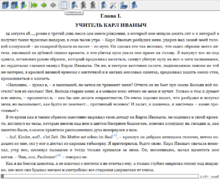FBReader
Maemo | |
| Stable release | 3.1.4
/ February 4, 2023 |
|---|---|
| Preview release | 4.0 beta 45
/ February 8, 2023 |
| Repository | |
| Written in | e-book reader |
| License | Linux: Formerly GPL;[1] GPL and commercial licenses formerly available.[2] Open-source versions are now discontinued, and it is only available under a proprietary license. |
| Website | fbreader |
FBReader is an
, and other platforms.It was originally written for the
Supported formats include EPUB, FictionBook, HTML, plucker, PalmDoc, zTxt, TCR, CHM, RTF, OEB, mobi without DRM, and plain-text.[3]

It was formerly
History
Nikolay Pultsin wrote the first FBReader; the tool was released for the
The original FBReader was written in C++; however, in 2007[7] a fork called FBReaderJ was created[by whom?], which was written in Java. As the Android platform became available in the following years, this fork became the codebase for the Android software application, while the C++ codebase remained in use for other platforms.[8]
In 2015 the software for all platforms became closed-source: the old open-source code hasn't been updated since. The Android app was split into Free and Premium versions, both closed-source, with the Premium version adding integrated support for PDF and for machine translation.[9]
Components
For easy
Features
- support Multiple book BZIP2 archives.[10]
- encoding detection
- generates contents table.
- Embedded images
- hyperlinks
- Position indicator (substitutes for page number).
- library building
- Most Recent Book
- last read positions for all previously opened books
- List of last opened books.
- Automatic hyphenations
- Text search.
- Full-screen mode.
- Screen rotation by 90, 180 and 270 degrees.
- Text-to-speech
- To activate text to speech on the Android platform, install a TTS plugin[citation needed]
File format support
FBReader supports the following file formats:[11]
- EPUB : all the main features except the tables. CSS support is not complete.
- EPUB3 : does not support most of ePub 3 specific features
- Mobipocket : opens non-encrypted *.mobi files. DRM-protected files are not supported.
- FB 2.0 : fully supported
- FB 2.1 : lacks support of tables
- HTML : limited, sufficient support
- Plain text : supported, might not correctly split text into paragraphs.
- RTF : subset of RTF
- DOC (Microsoft Word) : subset of DOC
- PDF:
- Android: via separate plugin with third-party library
- Other platforms: not supported
- DjVu :
- Android: via separate plugin
- Other platforms: not supported
- Plucker :
- Android: not supported at this moment
- Other platforms: "absolute positioning" commands may be interpreted or ignored
- DAISY 3 : added to Go Read for Bookshare on Google Play (a fork of FBReaderJ by Benetech)
Multi-Platform Support
- Tizen
- Microsoft Windows
- BlackBerry 10
- Mac OS X
- FreeBSD
- Linux
- mobile Linux devices:[12]
- Sharp Zaurus with Qtopia-based ROMs, pdaXrom or OpenZaurus ROM.
- Archos PMA430.
- Siemens Simpad with Opensimpad 0.9.0/Opie ROM.
- Nokia 770/N800/N810 Nokia Internet tablets (maemo).
- Pepper Pad 3.
- Motorola E680i/A780 smartphones.
- iLiad
- Digital Reader DR800SG
- Hanlin eReader
- Openinkpot - OS replacement for Hanlin eReader and Hanvon N516
- e-book readers
- SmartQ 5 and SmartQ 7
See also
- Comparison of e-book readers
- Comparison of e-book formats
- Comparison of Android e-reader software
- Comparison of iOS e-reader software
References
- ^ https://github.com/geometer/FBReader/blob/master/fbreader/LICENSE FBReader License
- ^ https://web.archive.org/web/20180719134505/https://fbreader.org/android FBReader for Android
- ^ FBReader: About FBReader
- ^ "FBReader for Android". 10 July 2011.
- ^ "FBReader: obsolete versions". Archived from the original on 2008-07-24. Retrieved 2008-07-01.
- ^ FBReader and its .fb2 format, maemo.org forum, 2005
- ^ "geometer/FBReaderJ". GitHub. Retrieved 2015-07-03.
- ^ "geometer/FBReader". GitHub. Retrieved 2015-07-03.
- ^ "FBReader for Android". 10 July 2011.
- ^ "MobileRead Wiki - FBReader".
- ^ E-book formats, supported and not supported | Free eBook Reader - Free!
- ^ "MobileRead Wiki - FBReader".

